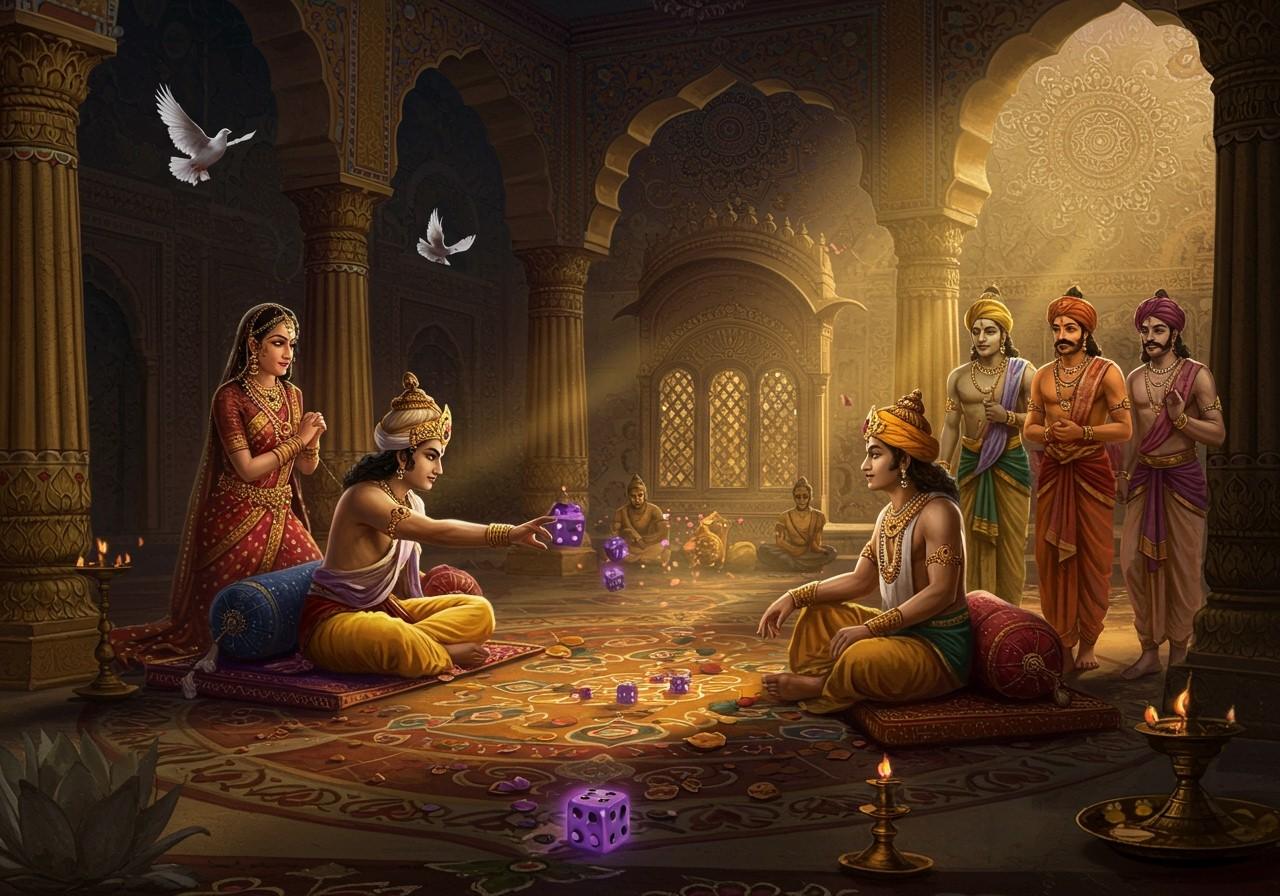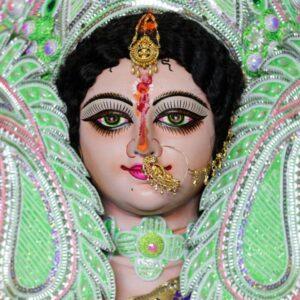
The Mahabharata, a cornerstone of Indian mythology and philosophy, unfolds a complex narrative of family conflict, duty, and destiny. At its heart lies the infamous Game of Dice, a pivotal event that irrevocably alters the course of the Pandavas’ lives and sets the stage for the monumental Kurukshetra War. This blog delves into the significance of this fateful game, exploring its context, consequences, and enduring lessons.
Historical and Cultural Significance
Composed by Sage Vyasa, the Mahabharata is deeply embedded in Indian culture. The epic narrates the power struggle between the Pandavas and Kauravas, two sets of cousins vying for the throne of Hastinapura. Gambling, a prevalent practice in ancient India, was often imbued with symbolic meaning, representing fate and chance. The Game of Dice, orchestrated in the royal court of Hastinapura, becomes a microcosm of the broader conflict, highlighting the treacherous nature of ambition and the fragility of dharma.
Shakuni, the maternal uncle of the Kauravas, masterminds the game, employing loaded dice to ensure the Pandavas’ downfall. This act of deception underscores the insidious role of manipulation and the perversion of justice. The setting itself, Hastinapura, the capital city, amplifies the political ramifications of the game, transforming a private dispute into a public spectacle with far-reaching consequences.
The Unfolding Tragedy
Despite anticipating treachery, Yudhishthira, the eldest Pandava, accepts the invitation to the game, bound by his sense of duty and kingly honor. Shakuni’s loaded dice strip the Pandavas of their wealth, kingdom, and ultimately, their freedom. The game reaches its tragic climax when Yudhishthira, in a moment of desperation, gambles away Draupadi, his wife, leading to her public humiliation and attempted disrobing. This act of profound disrespect becomes a rallying cry for the Pandavas and fuels their burning desire for revenge.
Draupadi’s courageous defiance and pointed questions to the assembled elders expose the moral bankruptcy of the Kaurava court. Yudhishthira’s compulsive gambling and the Kauravas’ gleeful exploitation of his weakness lay bare the psychological complexities of the characters and the destructive power of unchecked ambition. The Game of Dice serves as a stark reminder of the dangers of unchecked power and the erosion of ethical values.
Enduring Themes and Lessons
The Game of Dice encapsulates several enduring themes central to the Mahabharata. The conflict between dharma (righteous conduct) and adharma (unrighteousness) is brought into sharp focus. Yudhishthira’s moral dilemma, torn between his duty as a king and his personal integrity, underscores the challenges of ethical decision-making. Draupadi’s humiliation and subsequent resistance become a powerful symbol of the struggle against patriarchal oppression.
Learn more about women’s strength in epics.
The game also explores the interplay of fate and free will. While destiny may play a role, the characters’ choices ultimately shape their outcomes. The concept of karma, the principle of cause and effect, is woven into the narrative, highlighting the consequences of actions. The Game of Dice serves as a cautionary tale against greed, pride, and the pursuit of power at any cost.
Cultural Impact and Modern Relevance
The Game of Dice has permeated Indian culture and continues to resonate in contemporary society. Its depiction in art, literature, and popular culture reinforces its enduring relevance. The story serves as a cautionary tale about the dangers of gambling and the importance of ethical conduct. Draupadi’s courage and resilience continue to inspire, particularly in discussions about gender equality and women’s empowerment.
The Game of Dice also prompts reflection on the timeless questions of justice, morality, and the nature of leadership. It reminds us that true leadership requires wisdom, integrity, and a commitment to the greater good, not the pursuit of personal gain. The lessons learned from this pivotal event in the Mahabharata remain as relevant today as they were centuries ago.
Learn more about dharma in epics.
Poojn.in: Connecting You to India’s Spiritual Heritage
Poojn.in, India’s leading online store for cultural and religious goods, offers a wide selection of products to connect you with the rich traditions of the Mahabharata. Explore our collection of:
- Spiritual Books and Scriptures: Delve deeper into the Mahabharata and other sacred texts with our curated collection of books and commentaries. Explore our comparative studies.
- Puja Items and Accessories: Enhance your spiritual practice with authentic puja items, including incense, diyas, and offerings. Find high-quality camphor and other essential puja supplies.
- Educational Resources: Discover engaging resources for children and adults to learn about the Mahabharata and its timeless lessons. Explore characters and lessons in epics.
Poojn.in is committed to providing high-quality products and resources to support your spiritual journey and connect you with India’s rich cultural heritage.

